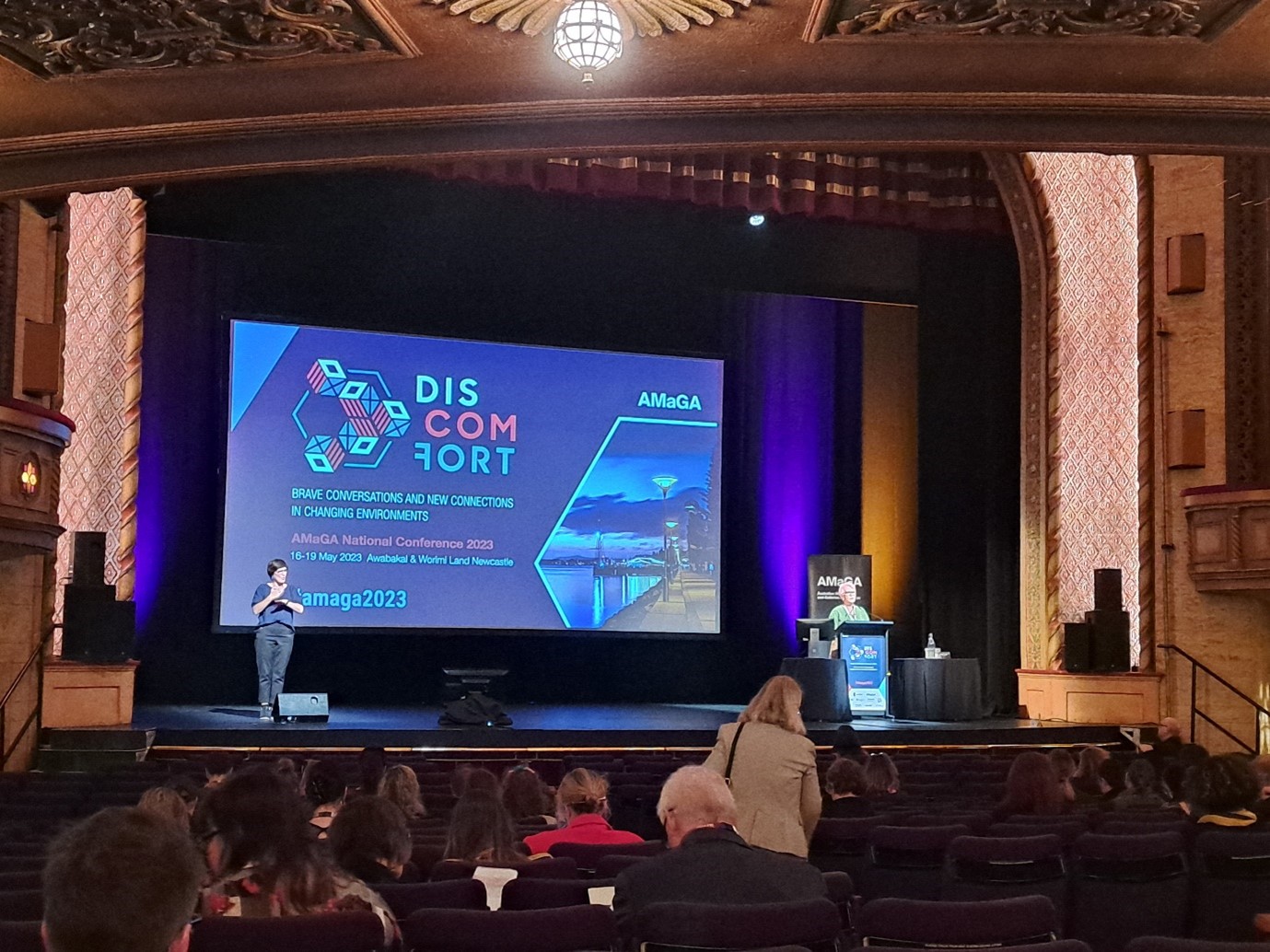Liz Long is Assistant Director DAIR (Digital Archives Innovation and Research) at The National Archives of Australia. She recently attended the AMaGA 2023 Conference with support from the DPC Career Development Fund, which is funded by DPC Supporters.
As a DPC grant recipient, I attended the Australian Museum and Gallery Association’s (AMaGA) conference in Newcastle from 16-19 May 2023. The theme, Discomfort: Brave conversations and new connections in changing environments, was largely explored via two key concepts of rapid technological and socio-cultural change in GLAM institutions. The two main themes of digital disruption and listening to marginalised voices made for a rich program that left me inspired rather than overwhelmed or weighed down by the all-too-common guilt that is felt by cultural heritage workers around our institutions’ past links with colonialism.

AMaGA welcome in the Civic Theatre, Newcastle (17 May 2023).
The keynote by Dr Michael Mossman, architect, and Kuku Yalanji man, about the aura of terror was confronting but also ultimately positive about the huge potential for relationships between First Nations people and cultural institutions. He drew attention to the physical presence of the architecture of cultural institutions and their history of terror for First Nations people but also celebrated the many positive changes that were happening in this space.
Many of the presentations showed examples of breaking down the traditional boundaries between archivist or curator and the world around them. This fed into the tension between the potential of new technologies and their risks and pitfalls. The strong theme that united all was the need for true collaboration.
The National Film and Sound Archive presented their new AI tool for enhancing metadata and discoverability of AV material. It’s currently only used internally due to a mismatch between ethical needs and technical limitations. The tool incorporates facial recognition and both text and speech transcription and shows great potential to support the limited resources in accessioning and description. But as an off the shelf model, it is not adapted to unique archives needs.
The tool has broken down the effort to discover and describe the collection. But it has also inadvertently removed the protective boundaries that keep sensitive, secret, or potentially traumatising records closed from general view by auto-playing content in the search interface before a record is selected to view. The collection contains, among other things, graphic erotica, violence and culturally sensitive First Nations materials. As archives lack the resources of the huge tech giants, they are forced to adapt tools not designed for them and create workarounds. The current solution is to quarantine sensitive records away from this tool which limits its use around some of the most profound and important sections of the collection.
The panel discussion, No one truth: Revealing the real history of Pentridge Prison, included two curators and a former prison inmate discussing the development of the museum audio tours in the site of the notorious H-Division of the now closed down Pentridge Prison in Coburg, Melbourne. The conversation covered how history is recorded by groups in power and the need for multiple layers of truth telling, but also reflected on the ethical complexity of giving voice to criminals who had harmed others. Many other similar examples were given where first person accounts were included in exhibitions and archives of alienated or traumatised groups. Repeatedly, these accounts emphasised the importance of collections not sanitising their contents and truth telling as a form of healing.
Ultimately the conference was a call to break down the established ways of doing things and relationships and seek out new ways for the sector to interact with the world. While the power and ongoing role of curating, in galleries, archives or museums, remains, relationships with the wider world are changing. The speakers challenged the idea of objectivity and looked for different ways of working. They also emphasised the importance of interdisciplinary collaboration, whether that be with information technology experts, community archives, First Nations people, or another group with important knowledge and perspectives.
These issues are not new, but can often surface in digital collections in ways that make it difficult to separate the form and the content. I walked away determined to use this wholistic approach incorporating ethics and inclusiveness more deliberately to all my work in digital archiving and preservation.
Acknowledgements
The Career Development Fund is sponsored by the DPC’s Supporters who recognize the benefit and seek to support a connected and trained digital preservation workforce. We gratefully acknowledge their financial support to this programme and ask applicants to acknowledge that support in any communications that result. At the time of writing, the Career Development Fund is supported by Arkivum, Artefactual Systems Inc., AVP, Ex Libris, Iron Mountain, Libnova, Max Communications, Preservica and Twist Bioscience. A full list of supporters is online here.

















































































































































